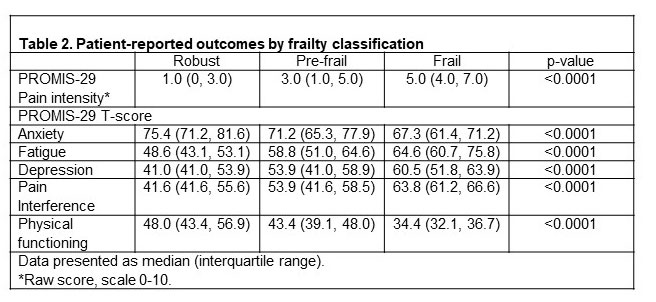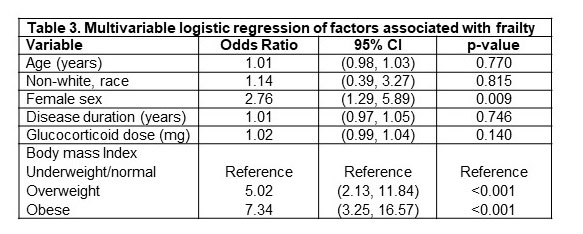Session Information
Date: Saturday, November 12, 2022
Title: Vasculitis – ANCA-Associated Poster I: Epidemiology, Outcomes, and Classification
Session Type: Poster Session A
Session Time: 1:00PM-3:00PM
Background/Purpose: Frailty is a syndrome characterized by an increased vulnerability to stressors and is associated with disability and early mortality. Frailty may be accelerated in patients with vasculitis. The prevalence of frailty and factors associated with it in patients with vasculitis remains unexplored.
Methods: VascStrong is a longitudinal study utilizing the Vasculitis Patient-Powered Research Network (VPPRN), an internet-based prospective longitudinal cohort. Data elements collected included type of vasculitis, demographic, use of medications, and patient-reported outcomes including patient global assessment (PGA) and Patient-Reported Outcomes Measurement Information System (PROMIS).
Frailty was measured by the FRAIL scale, a self-report measure which queries on 5 domains: 1. Fatigue, 2. Resistance (inability to climb 10 stairs), 3. Ambulation (inability to walk several blocks), 4. Illnesses (≥5/11 comorbidities), and 5. Loss of Weight (≥5% weight loss in the last year). Patients were classified as robust, pre-frail, and frail based on 0, 1-2, or ≥ 3 criteria, respectively. Most recently collected PGA and PROMIS scores for anxiety, fatigue, depression, pain interference, pain intensity, and physical functioning domains were analyzed by frailty categories. A multivariable logistic regression was performed to identify factors independently associated with frailty in the entire cohort.
Results: The survey collected information from October 8, 2021-January 15, 2022, and 328 responses were included. The most common diagnosis was granulomatosis with polyangiitis (39.3%), followed by eosinophilic granulomatosis with polyangiitis (12.5%), microscopic polyangiitis (11.9%), and giant cell arteritis (7.6%). Patients had a mean age of 59.5 years and were predominantly female (71.6%) and non-Hispanic white.
Prevalence of robustness, pre-frailty, and frailty was 36.3%, 42.1%, and 21.6%, respectively. The majority of patients with each form of vasculitis were rated as frail or pre-frail. Patients with polyarteritis nodosa, cryoglobulinemic vasculitis, urticarial vasculitis, and Takayasu’s arteritis were more commonly pre-frail or frail, compared to patients with other types of vasculitis. Among the individual FRAIL domains, fatigue and resistance were the most frequent (47.0% and 29.6%, respectively) while illnesses was the least common (2.4%). Pre-frail and frail patients reported worse pain (intensity and interference), fatigue, depression, and physical function. In the multivariable logistic regression, frailty was independently associated with female sex (OR 2.78 [95% CI 1.29,5.89]), being overweight (OR 5.02 [95% CI 2.13,11.84]), and obesity (OR 7.34 [95% CI 3.25,16.57]).
Conclusion: Self-reported frailty or pre-frailty is prevalent in the majority of patients with multiple forms of vasculitis. Frailty is independently associated with female sex, overweight, and obesity. Future work will be focused on identifying factors affecting frailty trajectories and outcomes and identifying interventions to ameliorate frailty in patients with vasculitis.
To cite this abstract in AMA style:
Sattui S, Stadler J, Burroughs C, Larson K, Yeung C, Merkel P, Spiera R. Prevalence of Frailty and Associated Factors in Patients with Vasculitis [abstract]. Arthritis Rheumatol. 2022; 74 (suppl 9). https://acrabstracts.org/abstract/prevalence-of-frailty-and-associated-factors-in-patients-with-vasculitis/. Accessed .« Back to ACR Convergence 2022
ACR Meeting Abstracts - https://acrabstracts.org/abstract/prevalence-of-frailty-and-associated-factors-in-patients-with-vasculitis/



